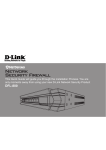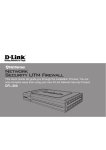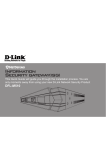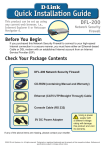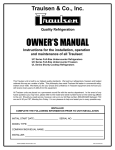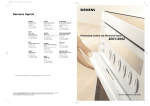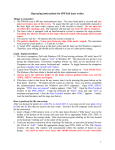Download D-Link DFL- 2500 Installation guide
Transcript
Building Networks for People Network Security Firewall This Quick Guide will guide you through the installation Process. You are only moments away from using your new D-Link Network Security Product DFL-2500 DFL-2500 Quick Installation Guide 1.Before You Begin 1.1 Check Your Package Contents....................................................................1 2.Indentifying Components 2.1 Front View................................................................................................2 2.2 LCD Panel.................................................................................................3 2.3 LED Indicators...........................................................................................5 2.4 Default interface attribute definition..........................................................5 3.Connecting the DFL-2500 3.1 Setting up Firewall to your Network........................................................6 4.Configure DFL-2500 4.1 Configure your Computer’s IP..................................................................7 4.2 Using the Setup Wizard.............................................................................8 5.Appendix 5.1 How to Configure Static IP Manually on Microsoft Windows XP..............16 5.2 How to Configure Static IP Manually on Apple MAC OS X...........................17 6.WARRANTY 1 DFL-2500 Before You Begin 1.1 Check Your Package Contents Your NetDefend Network Security Firewall package should contain all the items listed below. If any of these items is found damaged or missing in your package, report it to your reseller immediately for replacement. One (1) DFL-2500 NetDefend™ Network Security Firewall One (1) Power Cord One (1) Console Cable (RS-232 cable) One (1) Ethernet (CAT5 UTP/Straight Through) Cable One (1) Ethernet (CAT5 UTP/Cross-over) Cable One (1) CD-ROM (containing QIG/Manual ) Two (2) Rack Mount Brackets DFL-2500 01 Power Cord Rack Mount Brackets Ethernet Cable (Straight-Through) Ethernet Cable (Cross-over) Console Cable CD-ROM 2 Identifying Components The following illustrates the front panel of the DFL-2500 and explains the front panel’s key components: 2.1 Front View 1 1. LCD Panel 2 3 4 5 6 Used to display operation messages and various status of the DFL-2500. See the following section for details. 2. Power LED Power indication of the DFL-2500. 3. System LED System status indication of the DFL-2500. 4. Keypad Operation keys used in conjunction with the LCD panel. 5. Ethernet ports Connect to Ethernet cables that connect to broadband modems and network switches. 6. Console Port Connects to RS-232 console cable that connects to PC. The console port is hidden behind a protection coverlid that can be opened by pulling down the lid. 02 DFL-2500 Quick Installation Guide 2.2 LCD Panel and Keypad When you turn on the power of the DFL-2500, the LCD panel will display the following message: “Press Keypad to enter setup” and press any key on the keypad to enter the startup menu. If after five seconds, you do not press any key on the keypad, the DFL-2500 will automatically start the system. 2.2.1 Startup Menu Back Button Confirm Button Not Used Next Button Keypad buttons definition in Startup Menu If you press any key within five seconds after power-on, the LCD will display two options: 1. Start Firewall: If you select this option, the system will start, using the configuration saved inside the device. 2. Reset Firewall: If you select this option, the system will start, using the factory default configuration. Note: If you select “Reset Firewall” and confirm this option, all previous configurations that you saved in this device will be lost forever. 03 DFL-2500 Quick Installation Guide 2.2.2 Device Status and Information Next Button Back Button Keypad buttons definition in Status Information After the DFL-2500 has completed its system startup, the LCD panel is ready to display the status and information of this device. You can use the keypad to select a desired display option. The following shows status and information that can be displayed on the LCD panel. Item Description Model name: Display the device model name. System Status: Display system working status. CPU Load: Connections: It will show the CPU utilization and concurrent session Total BPS: Total PPS: Concurrent traffic statistics per second. Concurrent packets statistics per second. Date: Time: Device current date. Device current time. Uptime: Mem: Device boot up time. System memory utilization. IDS Sigs: It will display IDS signature information. WAN1: WAN2: WAN3: WAN4: DMZ: LAN1: LAN2: LAN3: Display each interface IP address Core Version: Display firewall firmware version. 04 DFL-2500 Quick Installation Guide 2.3 LED Indicators LED Status Color Description Power Solid green Light off Green The device is powered on. The device is powered off. System Solid green Light off Blinking green Green System is operating properly. The device is not working. System is defective, such firmware upgrade fail. Phone Jack LED Light off Green light (right) Solid Green Blinking Green Phone Jack LED Light off light (left) Solid green Solid orange No link Link present Port is sending or receiving data. Green/ Port is operating at 10Mbps. Orange Port is operating at 100Mbps. Port is operating at 1000Mbps. 2.4 Default Interface Attribute Definition Wording on Front plate Default name in firewall Default interface type definition Default interface IP Address Default DHCP Status 1 WAN1 Static IP 192.168.110.254/24 Disable 2 WAN2 Static IP 192.168.120.254/24 Disable 3 WAN3 Static IP 192.168.130.254/24 Disable 4 WAN4 Static IP 192.168.140.254/24 Disable 5 DMZ Static IP 172.17.100.254/24 Disable 6 LAN1 Static IP 192.168.1.1/24 Disable 7 LAN2 Static IP 192.168.2.1/24 Disable 8 LAN3 Static IP 192.168.3.1/24 Disable Note: 05 For security reason, default only allow LAN1 interface (192.168.1.1) that can login into firewall GUI from Web browser. You also can modify this configuration after login into firewall GUI. About the detail set up procedure, please refer to the user’s manual. Connecting the DFL-2500 3 3.1 Connecting Firewall to Your Network A. First, connect the power cord to the receptor at the back panel of the DFL-2500 and then plug the other end of the power cord to a wall outlet or power strip. Then powered on the DFL-2500 using the on/off switch. Now the Power LED will turn ON to indicate proper operation. B. 1. Powered off your Cable or DSL modem; some devices may not have a on/off switch and will require you to unplug the power adapter. Now, the DFL-2500 should be powered on and the Cable / DSL modem should be turned off. 2. Cable / DSL modem (Powered Off) - DFL-2500 (Powered On) Connect an Ethernet cable to the Ethernet jack located on the Cable / DSL modem. After the Ethernet cable is securely connected, powered on the Cable / DSL modem by turning on the unit or plugging in the power adapter. 3. Cable / DSL modem (Powered On) - DFL-2500 (Powered On) Insert the other end of the Ethernet cable to one of the Ethernet ports on the front panel of the DFL-2500. The LED light above the Enternet port will illuminate to indicate proper connection. If the LED light is not illuminated, please go back to step B and repeat its instructions. C. Insert an Ethernet cable to the LAN1 port on the front panel of the DFL-2500 and connect it to a port on your network hub or switch. The LED light above the Ethernet port on the DFL-2500 will illuminate to indicate proper connection D. Connecting the computer that you will use to configure the DFL-2500 to the network hub or switch. 06 4 Configure DFL-2500 4.1 Configure your Computer’s IP Address Make sure that the network adapter in your computer is configured to use a static IP address with 192.168.1.1 as default gateway and 255.255.255.0 as netmask. Instructions on how to configure the network adapter can be found in the appendix. When you have completed the steps in this Quick Installation Guide, your connected network should look similar to this: Cable/DSL Modem DFL-2500 Switch Internal Network DMZ Network (optional) Computer1 07 Computer2 DFL-2500 Quick Installation Guide 4.2 Using the Setup Wizard The DFL-2500 provides Web based configuration. You can configure your DFL-2500 through Internet Explorer 6 or Firefox 1.0 browser in MS Windows, Macintosh or UNIX based platforms. Activate your browser. Then type the IP address of the DFL2500 into the Location (for Netscape) or Address (for IE) field and press “Enter.” For example: http://192.168.1.1. Open your Web browser and type http://192.168.1.1 / into the URL address box. Then press the Enter or Return key. (The IP Address shown in the example above is the default setting. If you have changed the IP Address of the DFL-2500 to conform to a network, then input that IP Address in the web browser, instead of the default IP Address shown.) Log on to the DFL-1600 web interface. To start using the DFL-2500 web interface you need to log on using the default username and password. Type the default Username/Password Username: admin Pasword: admin and click Login 08 DFL-2500 Quick Installation Guide Step1 - Welcome to the DFL-2500 setup wizard! This wizard will guide you through the setup of your DFL-2500 Click Next Step2 - Set up firewall administrator password First Enter the username that you want to use for the admin account. Enter the password that you want to use for the admin account. Click Next 09 2 DFL-2500 Quick Installation Guide Step 3 - Set up time and date Click Set time and date button for setting device Click Next Select the appropriate date Enter the appropriate time Click OK 10 DFL-2500 Quick Installation Guide Step 4 - Set up timezone Select the appropriate timezone. Enter the appropriate dayligt saving time settings. Click Next Step 5 - Select WAN interface Select the WAN interface that you want to use. Click Next 11 DFL-2500 Quick Installation Guide Step 6 - Configure WAN interface Select the appropriate configuration for the WAN interface, Click Next and continue to step 7.1 further down. Note: If you are unsure of which setting to select, please contact your Internet Service Provider. Step 7.1 - WAN Interface Type is Static IP If you selected Static IP you have to fill out the IP address information provided to you by your ISP. You will need to complete all the required fields except for Secondary DNS Server. Click Next 12 DFL-2500 Quick Installation Guide Step 7.2 - WAN Interface Type is PPPoE If you selected PPPoE (Point-to-Point Protocol over Ethernet) you will have to fill out the user name and password provided to you by your ISP. The PPPoE Service Name field should be left blank unless your ISP informs you otherwise. Click Next Step 7.3 - WAN Interface Type is PPTP Enter Username, Password and the PPTP Server IP address provided by your ISP. DHCP:If your ISProvider is using DHCP you should select the DHCP radio button. Static IP:If your Internet Service Provider is using Static IP you should select the Static IP radio button and enter IP Address, choose a Subnet Mask and enter the Gateway IP address. 13 Click Next DFL-2500 Quick Installation Guide Step 7.4 - WAN Interface Type is Big Pond If you selected Big Pond you will have to fill out the user name and password provided to you by your ISP. Click Next and continue to step 8. Click Next Step 8 - Set up built-in DHCP server If you want to use the built-in DHCP Server in the DFL-800, choose Enable DHCP Server in this screen. You then need to specify a range of IP addresses to hand out to the DHCP clients. This range is entered in the format “Start IP - Stop IP” i.e. 192.168.0.100 192.168.0.200. If you don’t want to use the built-in DHCP Server or configure it later, choose Disable DHCP Server. Click Next 14 DFL-2500 Quick Installation Guide Step 9 - Configure helper servers NTP Servers If enabled, specify which NTP Servers that should be used to syncronize the firewall time Syslog Servers If enabled, specify where the firewall should log, you can specify up to two Syslog recievers Step10 - Setup Wizard Complete Click Activate to complete your configuration. 15 Click Next Appendix 5 To connect to the DFL-2500 Network Security Firewall, make sure the network adapter in your computer is configured properly. Here is how to configure the network adapter manually to the correct IP-address. 5.1 How to configure Static IP Manually on Microsoft Windows XP Go to Start > right click on My Network Places > select Properties > Right-click on the Network Connection of the Ethernet adapter connecting to the DFL-2500 and select Properties. Click Internet Protocol (TCP/IP) Click Properties 16 DFL-2500 Quick Installation Guide Select Use the following IP address Set IP address to 192.168.1.30, Subnet mask to 255.255.255.0 and Default gateway to 192.168.1.1 Click OK Note: Except for 192.168.1.1, you could set your PC with any IP addresses that same as the 192.168.0.0/ 255.255.255.0 subnet. 5.2 How to Configure Static IP Manually on Apple Mac OS X Go to the Apple Menu Click on Network and Select System Preferences Click on Network 17 DFL-2500 Quick Installation Guide Select Built-in Ethernet in the show pull down menu Select Manually in the Configure pull down menu Set IP Address to 192.168.1.30, Subnet Mask to 255.255.255.0 and Router to 192.168.1.1. Click on Apply Now 18 WARRANTY 6 Warranty FCC Warning This equipment has been tested and found to comply with the limits for a Class A digital device, pursuant to Part 15 of the FCC Rules. These limits are designed to provide reasonable protection against harmful interference when the equipment is operated in a commercial environment. This equipment generates, uses, and can radiate radio frequency energy and, if not installed and used in accordance with this manual, may cause harmful interference to radio communications. Operation of this equipment in a residential area is likely to cause harmful interference in which case the user will be required to correct the interference at his own expense. CE Mark Warning This is a Class A product. In a domestic environment, this product may cause radio interference in which case the user may be required to take adequate measures. Warnung! Dies ist ein Produkt der Klasse A. Im Wohnbereich kann dieses Produkt Funkstoerungen verursachen. In diesem Fall kann vom Benutzer verlangt werden, angemessene Massnahmen zu ergreifen. Precaución! Este es un producto de Clase A. En un entorno doméstico, puede causar interferencias de radio, en cuyo case, puede requerirse al usuario para que adopte las medidas adecuadas. Attention! Ceci est un produit de classe A. Dans un environnement domestique, ce produit pourrait causer des interférences radio, auquel cas l`utilisateur devrait prendre les mesures adéquates. 19 DFL-2500 Quick Installation Guide Attenzione! Il presente prodotto appartiene alla classe A. Se utilizzato in ambiente domestico il prodotto può causare interferenze radio, nel cui caso è possibile che l`utente debba assumere provvedimenti adeguati. VCCI Warning VCCI Warning BSMI Warning 警告使用表 這是乙類的資訊產品,在居住的環境中使用時,可能會造成射頻干擾,在這 種情況下使用者會被要求採取某些適當的對策。 20






















